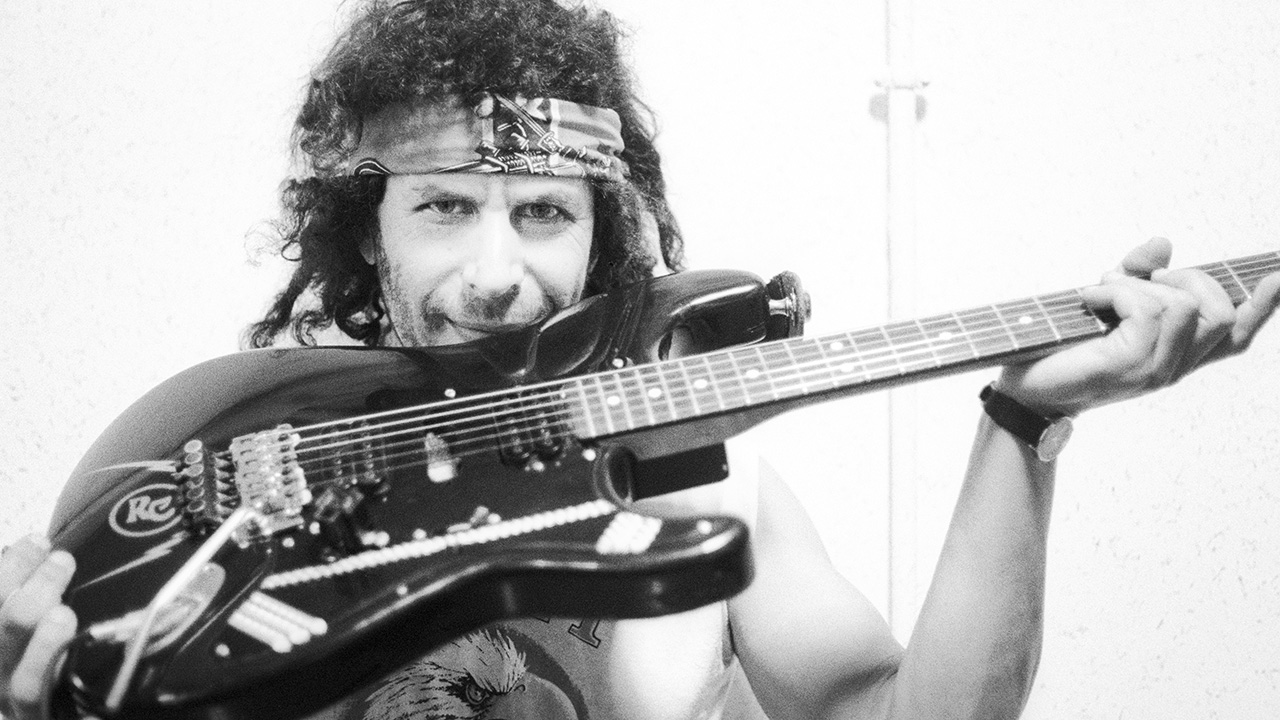Outer limits: How prog are Meshuggah?
These Swedes grew up on Marillion and influenced djent, yet the heaviness of their polyrhythmic sound sends many prog purists running for the hills. So we ask - how prog are Meshuggah?
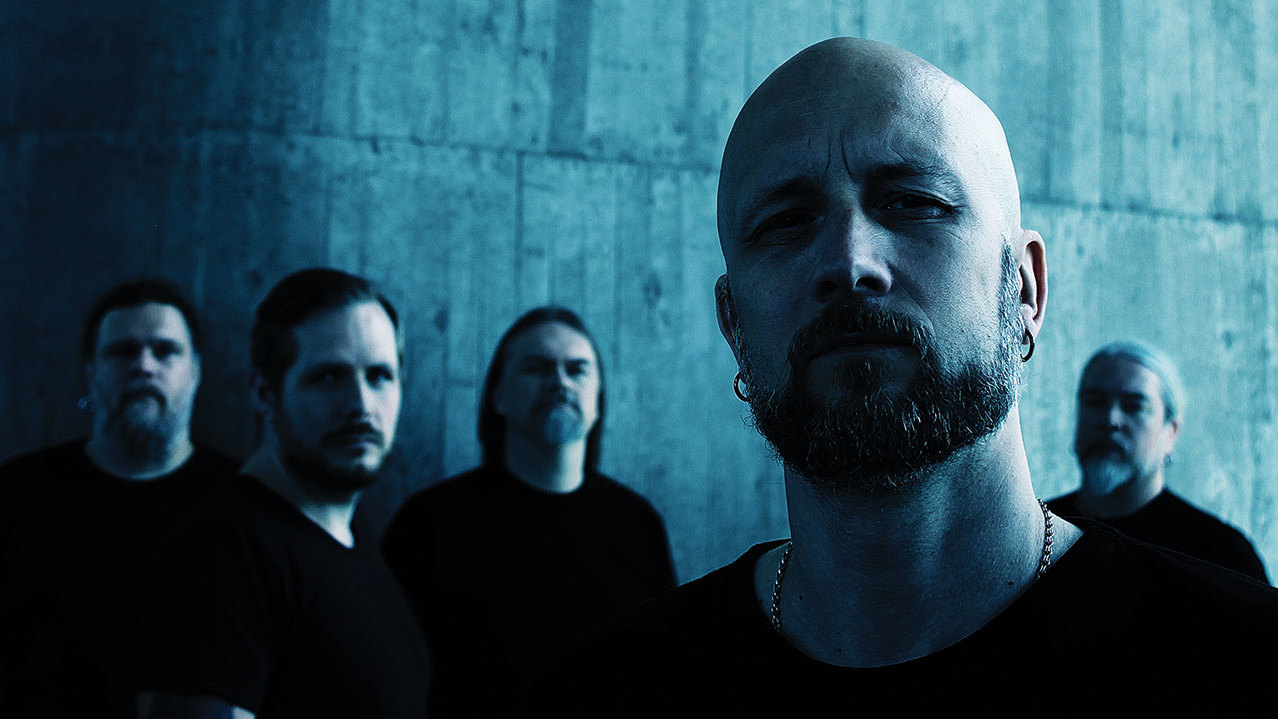
Select the newsletters you’d like to receive. Then, add your email to sign up.
You are now subscribed
Your newsletter sign-up was successful
Want to add more newsletters?

Every Friday
Louder
Louder’s weekly newsletter is jam-packed with the team’s personal highlights from the last seven days, including features, breaking news, reviews and tons of juicy exclusives from the world of alternative music.

Every Friday
Classic Rock
The Classic Rock newsletter is an essential read for the discerning rock fan. Every week we bring you the news, reviews and the very best features and interviews from our extensive archive. Written by rock fans for rock fans.

Every Friday
Metal Hammer
For the last four decades Metal Hammer has been the world’s greatest metal magazine. Created by metalheads for metalheads, ‘Hammer takes you behind the scenes, closer to the action, and nearer to the bands that you love the most.

Every Friday
Prog
The Prog newsletter brings you the very best of Prog Magazine and our website, every Friday. We'll deliver you the very latest news from the Prog universe, informative features and archive material from Prog’s impressive vault.
There’s often a huge divide between the bands that are believed to define a musical genre and those that effect irrevocable change within it. Formed in Umeå, Sweden in 1987, Meshuggah belong firmly to the latter camp: by no means a traditional progressive metal band, and yet absolutely fundamental to the evolution of the genre’s sound over the last 30 years, their status as standard-bearers for the free-spirited tech metal generation is beyond dispute.
Unfortunately, the flip side of making music that defies preconceptions and that seems to exist in its own unique sonic dimension is that Meshuggah are a tricky band to pin down to the usual markers of progressive legitimacy. But underneath the surface of the Swedes’ rampaging, avant-garde assault lies an inspirational bedrock of pure prog rock.
As the drummer, lyricist and chief spokesperson for the band, Tomas Haake is more than happy to attribute Meshuggah’s wild evolution to lessons learned from the most authentic of prog acts.
“Marillion were one of my big loves of music for a bunch of years, and Rush too,” he begins. “I think I was 11 when I heard Script For A Jester’s Tear for the first time. Mårten [Hagström, Meshuggah guitarist and a friend of Haake’s since childhood] played it to me and I immediately loved it. I’d never heard anything like it. We listened to the same kind of music and Rush and Marillion were a huge thing. For us two, they influenced us far more than anything jazz, for instance.
“I tend to forget about Marillion myself, and it’s a treat to talk about that stuff because it had a huge impact. I always found them intriguing from a rhythmic perspective, and the same with Rush. I dropped out of the Marillion thing when Fish left the band and I haven’t really listened to them since, but up until my early 20s, they were a big thing. It’s totally in our musical DNA.”
There may appear to be a yawning chasm between Marillion’s early music and the churning, hyper-technical blizzard of riffs and angularity that Meshuggah have peddled for the last three decades, but whether through the harnessing of off-kilter time signatures or through the sheer liberation of writing music that stoically spurns mainstream conformism, Haake’s band embraced a progressive mindset from early on. While their first few studio outings betrayed an adolescent devotion to Metallica, Meshuggah’s rapid transformation during the early 90s hit a first peak of groundbreaking efficacy on 1995’s Destroy Erase Improve: a breathtakingly futuristic and brutal reimagining of heavy metal’s bombastic essence, it brimmed with moments of gleeful weirdness and disorientating atmospherics. Much as Tool were dragging the post-grunge set into more adventurous territory at that time, so Meshuggah were applying progressive ideals to a traditionally conservative form of music.
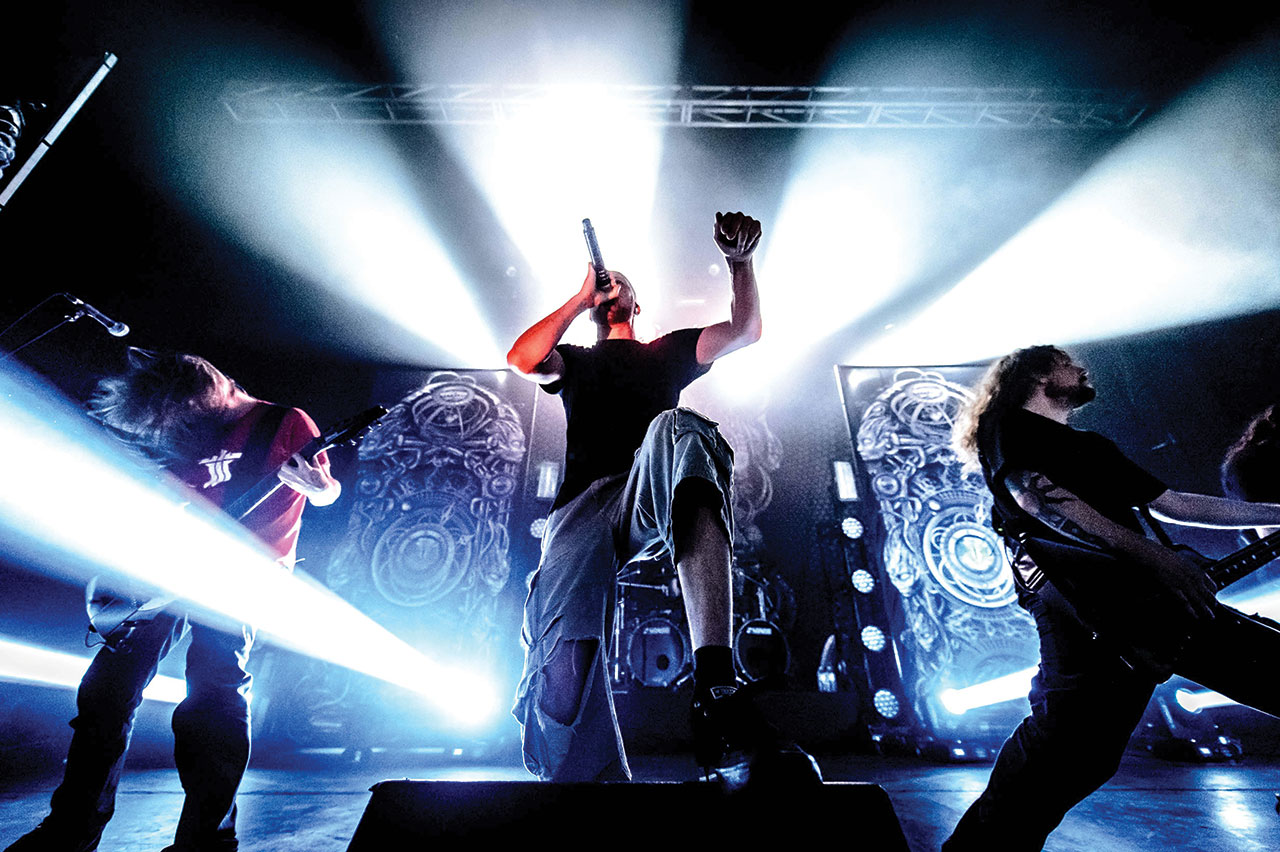
Over 20 years later, the band are more popular and revered than ever, but while their open-minded approach is plain for all to see, the intensity and aggression in Meshuggah’s music still seems to set them apart from more easily identifiable prog metal acts.
Sign up below to get the latest from Prog, plus exclusive special offers, direct to your inbox!
“Personally, I feel there’s a big difference between prog and progressive,” Haake notes. “I definitely see us as progressive in the sense that we’re trying to push the boundaries of what we’re doing within a set genre, but at the same time, there’s not a lot of connecting points with what I see as ‘prog’. I guess, for me, the evolution of prog – and I could be wrong and people will say I’m stupid! – it turned into bands like Dream Theater, and I can’t listen to them, I can’t take it. I don’t know exactly why. A lot of that stuff seems like regressive metal to me!”
When it comes to exploring Meshuggah’s music, the biggest stumbling block facing prog fans of a more mainstream inclination seems to be the sheer intensity and aggression that drives the Swedes’ wilfully intricate songs forward. A Meshuggah song generally hinges on a series of interwoven, cyclical riffs that ignore the usual rules of beats per bar and compositional symmetry, with vocalist Jens Kidman’s barbarous bellow providing the human glue that imbues the whole rampaging racket with a sense of real-world grit.
But the band’s greatest music offers a lot more than just huge, bewildering riffs and scabrous roars: listen between the lines and there’s a great deal of ambient subtlety and textural ingenuity going on too. 2005’s single-suite conceptual piece Catch ThirtyThree is a case in point: although at times excruciatingly heavy, the album remains a master class in the use of sonic space, with a gentle but undeniable debt to the grandiose soundscapes of Pink Floyd.
“I wouldn’t say that anyone else in the band is a Pink Floyd fan, but for me, those atmospheric parts are definitely connected to music like that,” Haake nods. “It’s subtle but it’s always been there. It’s something we want in there, because in a sense it’s the opposite of the onslaught, when it’s all full-on. You can have a beautiful guitar line that’s superficially out of place but somehow it works, so yeah, that’s an integral part of our music too. We try to find those little moments. On the new album [The Violent Sleep Of Reason], on the song Stifled, there are these beautiful guitar lines and four-part harmonies in the melody guitars and it turns into this beautiful thing that trails off. It’s very prog, I think!”
- Watch this pumpkin dance to Meshuggah
- Meshuggah's track-by-track guide to The Violent Sleep of Reason
- Inside the mind of Tomas Haake, Meshuggah's modern musical genius
- How contemporary world issues influenced the new Meshuggah album
Meshuggah’s influence on the prog metal of the 21st century is vast and unquestionable, particularly with regard to the so-called djent movement that has emerged from English and American suburbs over the last decade or so. Bands like TesseracT, Periphery and Uneven Structure simply wouldn’t exist without Meshuggah’s prescient and fearless metallic upgrade, and it’s the Swedes’ riffing style that has provided the creative starting point for the entire scene.
“Meshuggah were the band who first taught me about polyrhythms, how to apply them to riff writing,” states TesseracT founder and guitarist Acle Kahney. “Their constant quest for new guitar tones was also a huge inspiration. They fit into the prog world in the sense that they’re constant rule-breakers and experimentalists. In some ways, their atonal approach is almost the antithesis of traditional prog, which I think makes them even more prog in principle!”
“It’s interesting to be seen as the forefathers of that,” Haake muses. “I can see it. I haven’t listened to a lot of that stuff. The bands I seem to like have one foot in djent and one foot in fuckin’ pissed-off fire, like Car Bomb from the US and a Swedish band called CB Murdoc. Oh man, they’re off the charts. We’re not a djent band, but it’s definitely flattering to hear that we’ve inspired a younger generation to play and write music in a certain fashion.”
Not just godfathers of the djent phenomenon, Meshuggah can legitimately be praised for exerting a telling influence on modern prog rock too, most notably on Steven Wilson, and in particular the later part of the Porcupine Tree catalogue. Listen to the frequent eruptions of syncopated riffs on PT classics like Anesthetize and Nil Recurring and it’s not hard to make the connection or to acknowledge the mutual admiration society that has evolved between metal’s left-field contingent and prog’s more daring exponents. One result of this meeting of minds, of course, is that more and more prog fans are coming around to Meshuggah’s way of musical thinking, and shrugging off prejudice against previously off-putting extreme metal tropes in the process.
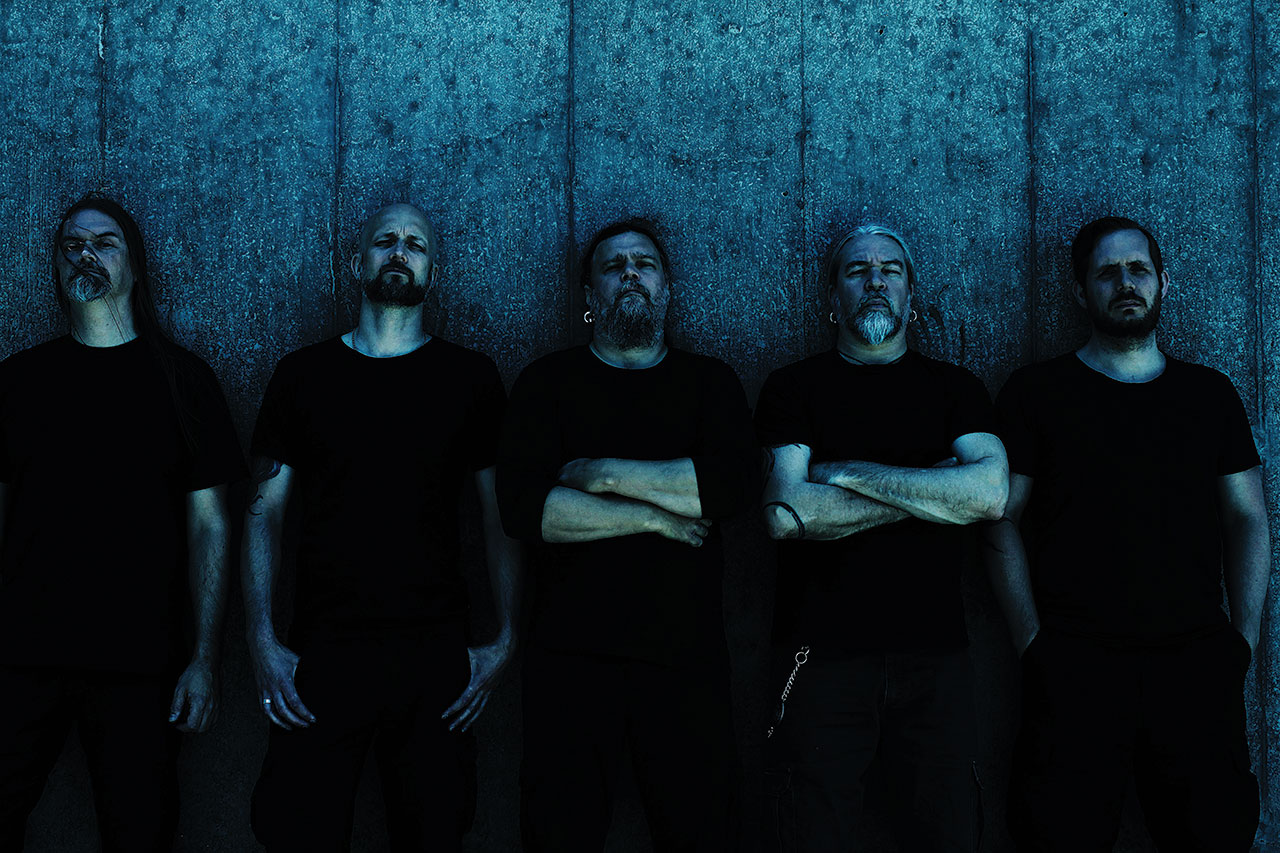
“We’ve been aware of that for quite a long time,” says Haake. “It’s very humbling, especially when you hear it from artists and musicians that you really look up to, like the guys in Tool or Porcupine Tree. At one point we had a written letter, if you can remember such things, from the first violinist from some orchestra in Oslo, so even that world knows about us. It’s people that you wouldn’t expect to like this kind of music, and they love it. So it’s an amazing thing, to be able to reach out into other areas like that. I think a lot of people have a hard time getting past the vocals, but it was a natural evolution for the band, to just not give a fuck about having melodic singing or hitting certain notes. It’s just a switch – Jens is either on or he’s off, just like me! I do know there are things in the music people could appreciate if they can get past that aspect of what we do. Or maybe someone could just threaten people and make them listen to us!”
Once you decide to embrace Meshuggah’s idiosyncratic barrage, there will inevitably come a point where you find yourself desperately trying to locate the anchoring pulse that drives even the most complex of the band’s songs. Dancing to Meshuggah is a mug’s game and not to be attempted unless you’re well schooled in polyrhythms, and yet Haake insists his band’s reputation for making music that consistently threatens to alienate the average listener is something of a smokescreen, behind which always lurks a strong groove. Training your ears to crack the band’s code poses a challenge, but once the Meshuggah sound clicks, you may never want it to stop.
“Sometimes there’s a backbeat where you can obviously hear that it’s rock’n’roll in its foundation,” the drummer explains. “But a lot of time, if you have this odd time cycle or riff that’s just repeating, extending over the bar lines, you might lose the stabilising point as a listener and then you might think, ‘What am I hearing here?’ But that pulse is always there somewhere. Not everyone will get it, but then we don’t care why people like our music, as long as they do!”
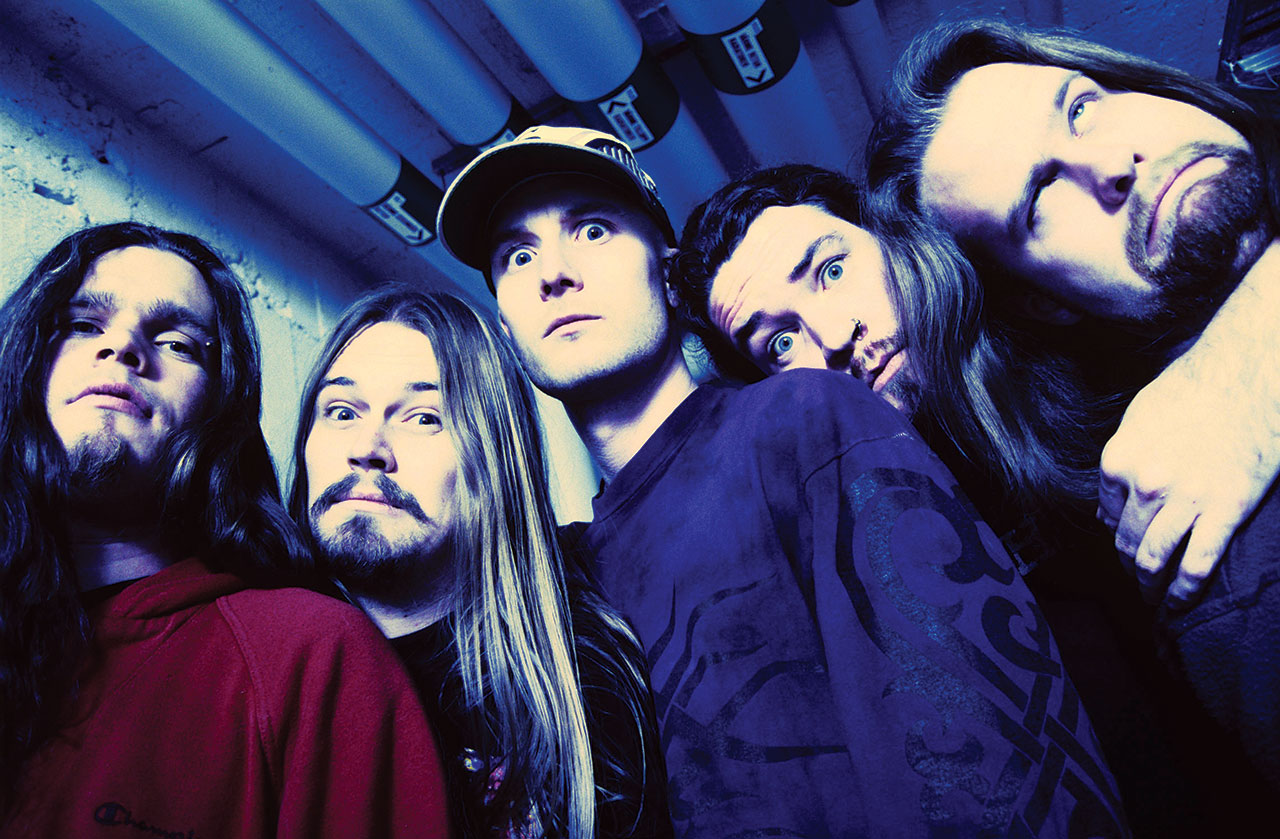
Meshuggah’s new album, The Violent Sleep Of Reason, could be the perfect entry point for the curious. Unlike many of the band’s records, which were generally pieced together with all five members of the band crowded around a laptop, it was primarily recorded live in the studio and provides a formidable showcase for the exquisite chemistry between these maverick musicians, while highlighting the diversity and depth of what they do.
Songs like the woozy, slow-motion Ivory Tower and elaborate opener Clockworks are progressive to their very bone marrow, sustained exercises in ensemble synchronicity that somehow seem to assimilate King Crimson’s dissonant menace, the fluid majesty of Floyd and even the amorphous haze of the electronic avant-garde, while always remaining true to the band’s self-identifying heavy metal instincts.
With a world tour on the horizon, Haake and his comrades continue to propagate a gospel of total creative freedom and a laudable dedication to exploring the limitless possibilities of heavy music. There’s no one else quite like them and the prog world is richer for their sideways contribution.
“Maybe we’re stupid, because no one needed to reinvent the wheel,” Haake says. “The wheel is still round, right? Maybe it’s just an odd shape now or we’ve made the wheel square! Obviously what we do is gonna change because we’re getting older and we’re listening to different kinds of music, so we’ll change with each album. We’ve just slowly grown over time. We never made a giant leap and we never will because it’s inherent in the kind of music we do that it can only reach a certain level.
“Something we see other bands struggle with is the fact that they fight tooth and nail and there are too many egos, whereas we’ve never had that. We all aim in the same general direction and we’ve never had one big fight in all the years we’ve been doing this, so that really helps. I think the future is looking pretty fucking cool.”
The Violent Sleep Of Reason is out now on Nuclear Blast. For more information, see www.meshuggah.net.
YOUR SHOUT!
Hyper-technicality? Check. Off-kilter time signatures? Check. OK then, just how prog are Swedish polymaths Meshuggah?
“As prog as it can fucking get!” - Nothingman
“The complex rhythms, often with differemt tempos at once make them prog.” - Patrick Bennington
“Extremely.” - Joe, Lord of Djent
“Prog enough to be the subject of peer-reviewed academic research pertaining to the advancement of contemporary polyrhythmic analysis.” - Matt Craig
“Not at all. They’re heavy metal. I still love them though.” - Elijah Rosgard
“Structure punch a la King Crimson and black chords.” - Joe Ech Obin
“For over two decades they have been one of the most challenging and unique metal bands; about as prog as Yes are a power metal band.” - Paul Brinkworth
“I have interest in them, it seems more experimental than prog, but then I don’t think Zappa is really my definition of prog either and I love Zappa.” - Ralph Kinscheck
“They are a prog band that somehow got stuck after creating one type of distinctive sound, so it’s difficult to classify I would say. At least there has not really been much progress within their discography.” - Frederik Schulze
“I think they’re math/technical metal. Their approach has remained pretty much the same, for a long time. So, where’s the progression?” - Luis Caballero
“People who say that Meshuggah haven’t really progressed much in their sound, seriously need to listen to their new album. I honestly thought the whole djent thing was getting boring, until the originators came out with their latest offering.” - Manas Sharma
“They sound exactly like every other band that people call prog but are too heavy to be, so yeah, they’re not prog. They are alright like.” - Jack Hayward
“Sprawlingly progressive. Amazing.” - Tim Bonney
“As prog as a Roger Dean painting of a Möbius strip wearing a cape on an Escher staircase. In space.” - Chris McGarel
“That’s a tough one. On the one hand, their music is metrically complex. On the other, much of this complexity comes from the fact that it’s created on a computer first, and the band then tries to learn to play it. It’s tough to be truly progressive when you’ve painted yourself into a corner of sonic brutality, brutality, and more brutality. Range is important.” - David O’David
Meshuggah’s Tomas Haake: The Drummers That Changed My Life

Dom Lawson began his inauspicious career as a music journalist in 1999. He wrote for Kerrang! for seven years, before moving to Metal Hammer and Prog Magazine in 2007. His primary interests are heavy metal, progressive rock, coffee, snooker and despair. He is politically homeless and has an excellent beard.
